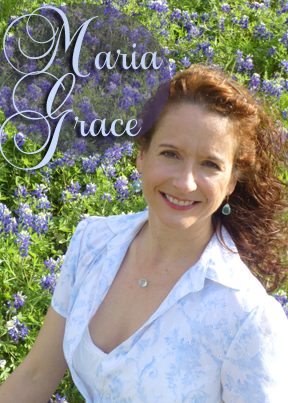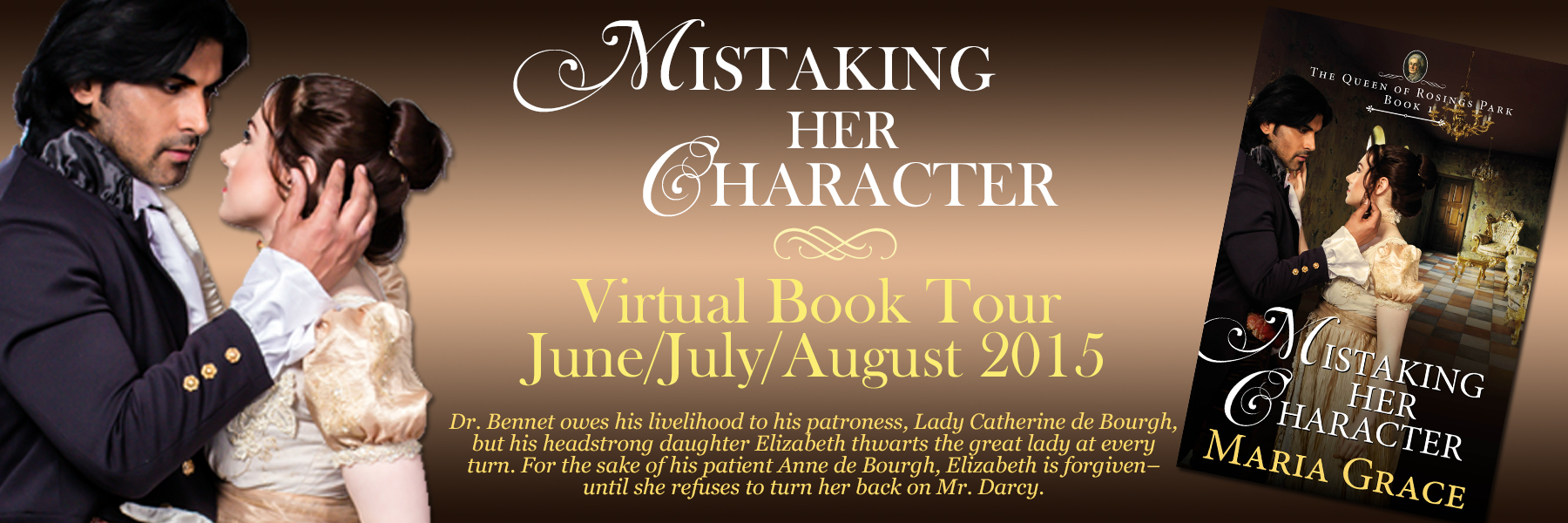Maria Grace has taken the time to offer a guest post on emotional abuse, which ties into her latest book, Mistaking Her Character.
Lady Catherine de Bourgh is prepared to be very generous when it comes to medical care for her sickly daughter, Anne – generous enough to lure noted physician Dr. Thomas Bennet to give up his London practice and move his family to Rosings Park. But his good income comes with a price: complete dependence on his demanding patroness’s every whim.
Now the Bennet family is trapped, reliant on Lady Catherine for their survival. Their patroness controls every aspect of the Bennet household, from the shelves in the closet to the selection of suitors for the five Bennet daughters. Now she has chosen a husband for headstrong Elizabeth Bennet– Mr. George Wickham.
But Lady Catherine’s nephew, Fitzwilliam Darcy, is not so sure about his aunt’s choice. He is fascinated by the compassionate Elizabeth who seems to effortlessly understand everyone around her, including him. Lady Catherine has other plans for Darcy, though, and she forbids Elizabeth to even speak to him.
As Anne’s health takes a turn for the worse, Darcy and Elizabeth are thrown together as Dr. Bennet struggles to save Anne’s life. Darcy can no longer deny the truth – he is in love with Elizabeth Bennet. But Lady Catherine will do anything to stop Darcy from marrying her – even if it means Elizabeth will lose everything she loves.
Please give Maria Grace a warm welcome:
In my latest book, I ended up tackling the issue of an emotionally abusive family relationship. I say ‘ended up’ because I honestly can’t say I set out to deal with the topic when I started the book. The entire family dynamic I had envisioned when I started ended up turned upside down and a far darker, more complex one emerged as several emotionally abusive characters moved to the forefront. Their behavior was so subtle that my readers were the ones that pointed out to me how abusive the characters were. This goes to show how very difficult emotional abuse can be to identify.
Emotion abuse is a difficult and often misunderstood issue. Very often, neither the abuser nor their victim recognize the abusive nature of the relationship. To both of them, it is just the way things are. Often the abuser never learned healthy coping mechanisms for the normal challenges of healthy, positive relationships. They respond to the normal ups and downs with an offensive pattern of verbal threatening, bullying, and criticism, with more subtle tactics like intimidation, shaming, humiliation, isolation, and manipulation thrown into the mix for good measure. The goal, conscious or not, is to control and subjugate the other person into obedience and even dependence in the relationship.
Although emotional and verbal abuse does not leave physical marks like physical abuse, its victims often assert that physical abuse would have been easier to bear because then, they and others around could more easily have recognized that abuse was happening. As the abuse continues and the emotional wounds deepen, abuse victims feel so emotionally unsafe that they begin to doubt their own feelings and abilities, their senses, opinions, memories, and even their judgement. To prevent negative reactions from their abusers, they will refrain from expressing their opinions and wants, leading to increasing feelings of vulnerability, and insecurity as they are trapped and powerless against the emotional control of their abuser. They become hypervigillant, guarding against anything that might trigger a bad response from the abuser as they accept the maxim that they are at fault for any and everything that disturbs their abuser. In the long run, depression, anxiety disorders and even post-traumatic stress disorder can result.
Abusers often share in a set of common characteristics, often beginning with having been abused themselves or witnessing abuse in their family of origin. Not all abuse victims or witnesses go on to be abusers themselves, though. Abusers often have explosive tempers, fed by possessiveness, jealousy and an intense desire to control the other person. Abusers tend to have low self-esteem and extremely rigid expectations of relationships. The other person and only the other person must compromise to meet expectations. More difficult still, the abuser projects blame for their own bad mood or behavior on the other person. They are never at fault, only the other person. Despite all this, they are able to project a very charming and likeable persona to the world around them.
Many behaviors qualify as emotional abuse. These may look normal, even innocuous in a one-off situation, and in truth, they might be excusable if they were to happen only on very rare occasions. However, one of the things that makes them abuse is the frequency with which they occur. Abusive behaviors include (but ae not limited to) verbally abusive speech like name calling, putting the victim down with constant criticism, yelling and screaming, and intentionally embarrassing the victim in front of others. Abusers often seek to control their victims, isolating them from friends and family, determining what they may or may not do, even what they might wear. Abusers frequently blame their own anger and bad behavior on the victim—‘if you didn’t make me so angry…’. If the victim does not capitulate, the abuser may progress to threatening to damage or destroy the victim’s possessions, to harm the victim or people the victim cares about, or even commit suicide themselves. The list goes on, but taken together, the abuse leaves the victim feeling helpless, powerless, worthless, and wondering if they have any worth apart from their relationship to the abuser.
Consequently, recognizing and breaking free from an abusive relationship is very difficult. Chances are, if one is wondering if their relationship is abusive, there is a good chance it is, especially friends and family hate the way one’s significant other treats them.
Can an abuser change? Very, very rarely, if there is a very deep commitment to change and to an accountability system, like a therapist or group, that will help them along the way. But an abuse victim should not rely upon the abusers promises to change. Ultimately, most victims find that leaving the relationship is their only option to stop the abuse.
If you believe you might be in an abusive relationship, here are some online resources that may be of help: Out of the Fog; Love is Respect
Though Maria Grace has been writing fiction since she was ten years old, those early efforts happily reside in a file drawer and are unlikely to see the light of day again, for which many are grateful. After penning five file-drawer novels in high school, she took a break from writing to pursue college and earn her doctorate in Educational Psychology. After 16 years of university teaching, she returned to her first love, fiction writing.
She has one husband, two graduate degrees and two black belts, three sons, four undergraduate majors, five nieces, six more novels in draft form, waiting for editing, seven published novels, sewn eight Regency era costumes, shared her life with nine cats through the years and tries to run at least ten miles a week.
She can be contacted at by email: [email protected]; Facebook; Google+; Amazon author page; Random Bits of Fascination; Austen Variations; English Historical Fiction Authors; Twitter; and Pinterest.
Buy the book:
- Amazon
- Amazon UK
- Amazon paper
- BN NOOK
- KOBO
- iTunes
- Scribd
- Oyster







Very insightful post. I think this kind of abuse is not always seen as such because it doesn’t leave visible wounds, but is one that will be the hardest to recover from. Thanks for writing about it.
The lack of visible scars is actually a big issue. Sometimes victims of emotional abuse wish it had been physical abuse because then both they and the rest of the world could look at it and agree, yes it happened. The lack of certainty and always wondering if you are the crazy one makes even acknowledging the emotional abuse difficult.
Serena, thank you for posting this guest post by Maria Grace. I think we are just starting to learn about the effects of emotional abuse in relationships. People who are domineering in this way are often charming to the outside world, as pointed out, so all too often the abuse goes unrecognized. It is perhaps a bit surprising
that bullies are often adults.
It’s amazing how charming people can be to the outside world and how different they are at home.
I think you’re right, Suko. We are still learning about it. It’s a recent phenomenon that we even all this sort of behavior abuse. One problem for the victims is that it is very difficult to consider themselves abused because there is no physical evidence of the abuse, just the deep hurt and feeling that there is something wrong with them, not the abuser.
This was a very informative post. Thank you for hosting and thank you, Grace, for sharing.
People don’t talk about emotional abuse much because it can be hard to identify. Our niece was in an emotionally abusive marriage and, a few years later, she’s still not completely over it. This is a wonderful guest post!
Thanks, Kathy. I agree. This guest post is fantastic.
Thank you, Kathy. You’re right, it is really hard to identify, both for the one living it and the ones on the outside. It is a shameful experience because you feel like it is your fault for being such an unworthy person, so you don’t want to let people know how awful you are. It is hard to recover because it shakes you to the very core, because the abuser attacks the foundations of who you are and your very worthiness to be loved. I hope your niece is able to get help and fully recover.
I love Grace’s books! I didn’t realize her latest had a darker theme. I’m looking forward to seeing how it plays out.
I was excited to host this guest post.
Thanks, Anna. It was a bit of a different direction for me. I was a little surprised how it all played out, but I am glad I got to write about this issue.